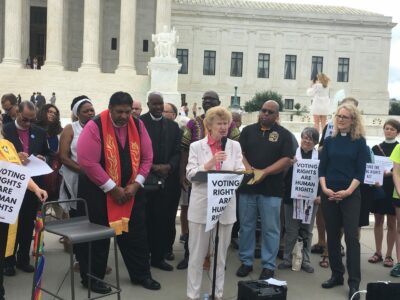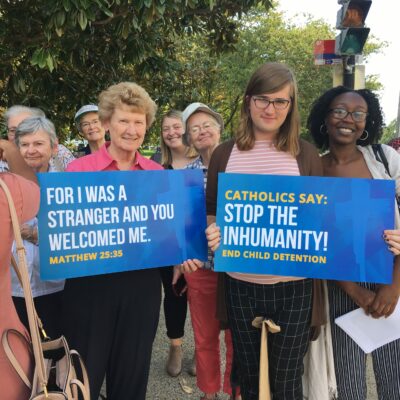
Above, Sister Richelle Friedman speaks in front of the Supreme Court at the Poor People’s Campaign Rally for voter and economic rights.
by Rita Waters, RSM
God will not forget your work and the love you have shown as you have helped his people and continue to help them.
Hebrews 6:10
In her work in Washington, D.C., Sister Richelle Friedman confronted injustice and worked for legislation to benefit people who are living in poverty or have low incomes. Advocating for the poor is not new to the Sisters of the Presentation. As Nano Nagle took her lantern into the streets of Cork, Ireland, she met the needs of those in poverty. Yet, poverty was not confined to her time. As the fourth leading cause of death in our country today, “Poverty is a moral travesty and a detriment to the soul of our nation,” states Bishop William Barber of Poor People’s Campaign. “There’s not a scarcity of resources, but a scarcity of political will. Until our nation’s leaders invest the great riches of this nation in ensuring equal justice for all, beginning with the poor and low-wealth of this nation, we cannot be silent.”
And silent Sister Richelle was not! She became a fierce champion of rights and equity, lobbying senators and congressmen/women to pass legislation beneficial to people of lower income status, such as adequate food and housing, livable wages, healthcare, child tax credit, immigration and more. Jann Jackson of The Annie E. Casey Foundation asserts, “They may never know Richelle’s contribution, but millions will suffer less because of her work.”
These values of justice, steeped in integrity and passion, so in line with the Presentation mission, were innate to Sister Richelle. She was nurtured by parents who believed that human rights were for all. Her mother Evelyn was a driving force in establishing a workers union at Ertl Toy Company. Upon seeing a homeless person in Chicago, her dad noted, “You are no better than that person. Nor are you less than the President of the United States.” These principles of equality and respect guided Sister Richelle’s interactions. Senator Chuck Grassley once told her, “We often disagree on the issues, but you always do so respectfully.”
Perhaps this sense of justice was the impetus in 1964 for her to join the Sisters of the Presentation whose mission is “to offer hope and love to our broken world by incarnating the hospitality of God, confronting injustice and working for peace.”
Sister Richelle’s first 20 years of ministry were in teaching. She valued teaching the principles of Catholic social justice: the preferential option for the poor, economic justice, the common good, meeting basic human needs, and respect for all people.
In his social justice papal exhortation, ”Joy of the Gospel,“ Pope Francis wrote, “The Church, guided by the Gospel of mercy, hears the cry for justice and responds to it with all her might. This includes eliminating the structural causes of poverty and promoting the integral development of the poor, and solidarity in meeting the real needs we encounter.” Sister Richelle told students, “If your gut is telling you that ‘something isn’t right’ about a particular situation, follow that feeling to its origin and you will likely discover an injustice.”
This was true for her as well as she witnessed the hardship of vulnerable populations while doing volunteer work. At a shelter for abused women, Sister Richelle encountered a woman with cerebral palsy who had been abused by her spouse. The woman’s mother told her she needed to return to her husband because “he was the best she could do.” Sister Richelle remembers, “I watched as she stumbled down the stairs, carrying everything in one paper bag, to return to the abusive situation. Back at the convent, I went to my room and wept.” On Saturdays, Sister Richelle distributed bread donated by a local bakery. One Saturday, she witnessed people waiting for the bread to arrive. They stood in the freezing rain for over an hour for a few loaves of bread. At the Catholic Worker House, a woman lamented to Sister Richelle that she would apply for a job, but did not have money for a bus ticket to the application site, nor clothing appropriate for the interview. No decent clothes, not even 35 cents for the bus!
Mission and Politics Interwoven
Believing that the root causes of these situations must be addressed, Sister Richelle set off for Washington in 1989 to carry out the Presentation mission through political ministry at the national level. This is consistent with Pope Francis’ conviction, “I engage in politics because everyone must engage in politics. And what is politics? A way of life for the polis, the city. The Gospel has a political dimension, which is to transform the social mentality of people so that it is directed to the common good.”
She joined the effort to eliminate structural causes of poverty and often led the charge. Amelia Keegan of Friends Committee on National Legislation said, “I have always admired Richelle’s tenacity to chase down senators in the hallways and to consistently call for what is right. She was a lobbying force, and at the same time, showed compassion and care for the people around her, asking about our lives and families, making us feel seen and valued.”

Sister Richelle Friedman joins the broad faith-based advocacy community to rally for just immigration policies.
Sister Richelle’s political ministry consisted of working with four organizations: NETWORK Lobby for Catholic Social Justice; McAuley Institute, a Sisters of Mercy entity that provided loans to develop affordable housing; Children’s Defense Fund; and the Coalition on Human Needs. Sister Richelle relays, “I always felt blessed to be with organizations whose missions correspond to our Presentation mission with its emphasis on systemic change and transformation of society. I felt I was continuing Nano’s work of acknowledging the dignity of each person and the right to have basic needs fulfilled.”
Julie Bodnar of the U.S. Conference of Catholic Bishops agrees, “Richelle has been an incredible witness of what it means to live out one’s values and to bring them into the public square.”
When asked what were some of her most poignant encounters, Sister Richelle enthusiastically responds, “Many interactions impacted my perspective and deepened my commitment; but talking with Rep. John Lewis (D-GA) was definitely a highlight. He shared that after the beatings the civil rights marchers endured crossing the Edmond Pettus Bridge in Selma, Catholic sisters took them in and bound up their wounds. It made me proud to be a sister.”
When the vote on the Affordable Care Act (ACA) was imminent, then House Speaker Nancy Pelosi asked Sister Richelle to accompany her to speak with Rep. Marcy Kaptur (D-OH). Rep. Kaptur, a Catholic who was debating whether or not to support the ACA along with six other Catholic Democratic members, ultimately voted “Yes.” Sister Richelle recalls, “For Speaker Pelosi, my presence as a Catholic Sister was significant.”
Sister Richelle’s co-worker Nicolai Haddal notes, “I will always be inspired by Richelle’s spirit of perseverance, optimism and determination. It is a spirit that we must hold onto as we continue the eternal pursuit of justice.”
After 33 years, Sister Richelle completed her political ministry in D.C. She plans to continue working for justice back in Iowa and urges everyone to get involved. ”Do advocacy wherever you are and whatever your ability,“ states Sister Richelle. ”Decisions are made on every level of government and affect virtually every aspect of our lives. Your involvement matters!“
Captions: